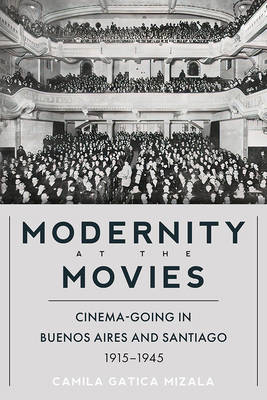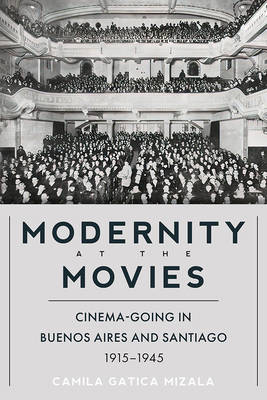
Je cadeautjes zeker op tijd in huis hebben voor de feestdagen? Kom langs in onze winkels en vind het perfecte geschenk!
- Afhalen na 1 uur in een winkel met voorraad
- Gratis thuislevering in België vanaf € 30
- Ruim aanbod met 7 miljoen producten
Je cadeautjes zeker op tijd in huis hebben voor de feestdagen? Kom langs in onze winkels en vind het perfecte geschenk!
- Afhalen na 1 uur in een winkel met voorraad
- Gratis thuislevering in België vanaf € 30
- Ruim aanbod met 7 miljoen producten
Zoeken
€ 99,45
+ 198 punten
Omschrijving
Cinema can both reflect the world as it is and offer escape from it. In Modernity at the Movies, Camila Gatica Mizala explores the ideas of reflection versus escapism and examines how modes of understanding the current moment emerged through the practice of going to the movies in Santiago and Buenos Aires between 1915 and 1945. Using cinema and variety magazines published in both cities, she analyzes the technology, architecture, attendance, behavior, language, censorship, and overall experience of cinema-going. These publications regularly engaged with important topics such as morality and urbanization and helped build a cinematographic audience. Gatica Mizala brings together the perception and reception of cinema as a modern art form, shifting the focus from the production of films to the experience of the audience when viewing them. By focusing on the audience instead of the films, this study is able to articulate the ways that cinema, as a modern activity, was incorporated into everyday life and discuss what it meant to be modern in early to midcentury Latin America.
Specificaties
Betrokkenen
- Auteur(s):
- Uitgeverij:
Inhoud
- Aantal bladzijden:
- 266
- Taal:
- Engels
- Reeks:
Eigenschappen
- Productcode (EAN):
- 9780822947677
- Verschijningsdatum:
- 27/06/2023
- Uitvoering:
- Hardcover
- Formaat:
- Genaaid
- Afmetingen:
- 156 mm x 230 mm
- Gewicht:
- 612 g

Alleen bij Standaard Boekhandel
+ 198 punten op je klantenkaart van Standaard Boekhandel
Beoordelingen
We publiceren alleen reviews die voldoen aan de voorwaarden voor reviews. Bekijk onze voorwaarden voor reviews.









